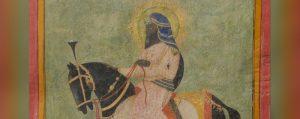
Nineteenth Century Sikhs
In 1799, a process of unification was started by Ranjit Singh virtually to establish an empire during the first quarter of the nineteenth century. He made use of an efficient army raised and trained more or less like the army of the East India Company. The use of the time-honoured suzerain-vassal polity was equally important in establishing his political control. Paying personal attention to revenue administration and trade in his large dominions he revived prosperity in the Punjab. Extending state patronage to all important sections of the population he attached them to the new empire. In the ruling class too, Hindus and Muslims came to form a substantial element.
The Sikhs formed the dominant element in the ruling class and had the largest share in jāgīrs assigned by Ranjit Singh and his successors. In state patronage in the form of revenue-free land, the Sikhs received a much larger share than Hindus and Muslims, but not at their cost. The state alienated more revenues now in favour of the religious grantees than in Mughal times. In fact Ranjit Singh only extended the pattern first set by Akbar and enlarged later by the early Sikh rulers. Some Sikh members of the ruling class patronized art and literature; a few took personal interest in traditional learning. The number of Sikhs was increasing during the early nineteenth century though only a small number of the new entrants were associated with government and administration or the army.
Prominent Sikh personalities in from the 1800’s era, the times of Maharaja Runjeet Singh and the turbulent years after. This section describes their biographies and contibutions to Sikh History In this section we concentrate on those Khalsa who have brought laurels to Sikhism and Khalsa itself.
Famous Sikh Personalities :Nineteenth Century (1800’s)
-
Ajit Singh, Raja
-
Fateh Singh Ahluvalia
-
Ajit Singh, Sandhanvalia
-
Gajja Singh, Mahant
-
Arur Singh
-
Gurcharan Singh
-
As Kaur
-
Gurmukh Singh, Bhai
-
Atar Singh Sandhanvalia
-
Hari Singh, Bhangi
-
Attar Singh, Sant
-
Hazara Singh, Giani
-
Attar Singh, Sardar Sir
-
Hira Singh Dogra
-
Bachhittar Singh, Bhai
-
Hira Singh, Maharaja Sir
-
Balvant Singh Canadian
-
Ilahi Bakhsh
-
Banta Singh
-
Jawahar Singh
-
Banta Singh, Bhai
-
Karam Singh, Sant
-
Bara Singh, Bhai
-
Kashmira Singh, Kanvar
-
Bechint Singh, Bhai
-
Kehar Singh Sandhanvalia
-
Bela Singh, Bhai
-
Kharak Singh, Maharaja
-
Bhag Singh, Bhai
-
Khem Singh Bedi, Baba Sir
-
Bhagwan Singh, Bhai
-
Kikkar Singh, Pahilvan
-
Bhagwan Singh, Gyani
-
Lahina Singh Majithia
-
Bhai Santokh Singh
-
Lahina Singh Sandhanvalia
-
Bhupinder Singh, Raja
-
Lakshman Singh, Bhagat
-
Bikrama Singh, Kanvar
-
Lal Singh, Raja
-
Bishan Singh, Giani
-
Mahitab Kaur
-
Buddh Singh, Baba
-
Makkhan Singh, Bhai
-
Buddh Singh, Bhai
-
Man Singh, Risaldar Major
-
Bur Singh, Bhai
-
Mangal Singh Ramgarhia
-
Chand Kaur, Maharani
-
Narinder Singh, Maharaja
-
Chanda Singh, Bhai
-
Nidhan Singh Panjhattha
-
Charan Singh, Bhai
-
Nihal Singh Ahluvalia
-
Charan Singh, Bhai
-
Nihal Singh Atarivala
-
Chatar Singh Atarivala
-
Partap Singh, Giani
-
Chet Singh
-
Pashaura Singh, Kanwar
-
Chet Singh Bajwa
-
Raj Kaur
-
Chet Singh, Bhai
-
Ram Singh Chhapevala
-
Dal Singh, Bhai
-
Ram Singh Nurpuria
-
Dal Singh, Bhai
-
Ram Singh, Baba
-
Dalip Singh, Bhai
-
Ram Singh, Bhai
-
Darbara Singh, Baba
-
Sadhu Singh Akali
-
Dasaundha Singh, Bhai
-
Sant Singh Giani, Bhai
-
Daya Kaur, Rani
-
Sardul Singh Caveeshar
-
Dayal, Baba
-
Sham Singh, Sant
-
Desa Singh Majithia
-
Sher Singh Atarivala
-
Dharam Singh, Bhai
-
Sohan Lal Suri
-
Dhaunkal Singh
-
Suchet Singh, Raja
-
Dhera Singh, Bhai
-
Surat Singh Majithia, Raja
-
Dhian Singh, Raja
-
Tej Singh, Raja
-
Dial Singh, Bhai
-
Thakur Singh Sandhanvalia
-
Dina Nath, Diwan
-
Ummer Nath, Dewan
-
Divan Chand, Misr
-
Zorawar Singh
-
Divan Singh Ramgharia
-